No, it’s not considered normal to have two periods in one month, especially if it happens consistently. However, there are situations where it can occur. The typical menstrual cycle lasts between 24 and 38 days, with 28 days being the average. Because calendar months are slightly longer than the average cycle, it’s possible to have two periods in one month, especially if your cycle is naturally on the shorter side.
Infrequent episodes of this kind are usually not cause for concern. But if it happens regularly or is accompanied by symptoms like heavy bleeding, pain, or fatigue, it could indicate a hormonal imbalance or another underlying medical condition. In such cases, it’s important to consult a GP or menstrual health provider for a proper assessment.
Common Causes of Having Two Periods in One Month
Several factors can influence how often you menstruate. Understanding the underlying causes can help you know when to monitor and when to seek medical advice.
1. Adolescence and Puberty
In the early years after menstruation begins, cycles are often irregular. Hormonal fluctuations can lead to shorter or longer cycles, making two periods in one month relatively common in teens.
2. Perimenopause
The transition to menopause, known as perimenopause, typically begins in the mid-40s but can start earlier. During this phase, hormone levels fluctuate, and menstrual cycles may become shorter, longer, heavier, lighter—or occur more frequently than usual.
3. Stress and Lifestyle Factors
Emotional stress, disrupted sleep, travel, sudden weight changes, or intense exercise can affect hormone regulation. These changes can temporarily disrupt your cycle and may lead to more frequent bleeding.
4. Thyroid Conditions
The thyroid gland helps regulate many bodily functions, including menstruation. Both an overactive thyroid (hyperthyroidism) and an underactive thyroid (hypothyroidism) can cause irregular or more frequent periods.
5. Polycystic Ovary Syndrome (PCOS)
While many people with PCOS experience infrequent or absent periods, some may have irregular and more frequent bleeding due to unpredictable hormone levels.
6. Uterine Conditions
Non-cancerous growths like fibroids or polyps in the uterus can cause symptoms such as heavy or prolonged bleeding, bleeding between periods, or frequent menstrual cycles.
7. Contraceptive Changes
Adjusting to a new method of hormonal contraception (like the pill, hormonal IUD, patch, or implant) can cause temporary changes in menstrual patterns. Missed pills or changes in routine may also trigger breakthrough bleeding or spotting.
8. Pregnancy-Related Bleeding
What may appear as a second period could actually be light bleeding due to implantation or early pregnancy. If pregnancy is possible, consider taking a test and follow up with your GP.
9. Infections or Inflammation
Pelvic infections, including sexually transmitted infections (STIs) or pelvic inflammatory disease (PID), can cause bleeding between periods or unusual spotting. These often require prompt medical attention.
When to Seek Medical Advice
Occasional irregular bleeding may not require intervention, but it’s best to consult a GP if you notice:
- Two periods a month for two or more consecutive cycles
- Very heavy bleeding or passing large clots
- Bleeding that lasts longer than a week
- Painful periods or severe pelvic cramping
- Bleeding between periods or after sex
- Signs of anaemia, such as tiredness, dizziness, or breathlessness
How to Track Your Menstrual Cycle
Monitoring your menstrual cycle can help you understand your body’s patterns and spot irregularities early. Use a calendar or a menstrual tracking app to log:
- Start and end dates of your period
- Flow intensity (light, moderate, heavy)
- Pain levels or cramping
- Mood changes or other symptoms (e.g. bloating, headaches)
Bringing this information to your GP can assist in making a diagnosis if your cycles become irregular or symptomatic.
Frequently Asked Questions
Can having two periods in a month mean I’m pregnant?
While you cannot have true periods during pregnancy, some women experience implantation bleeding or hormonal spotting early in pregnancy, which may be mistaken for a light period. If pregnancy is a possibility, take a home pregnancy test and consult your doctor.
Is it normal to get a period every two weeks?
Occasional short cycles may occur due to temporary hormone shifts, stress, or lifestyle changes. However, regular bleeding every two weeks may indicate an underlying issue such as a thyroid condition, PCOS, or uterine abnormality.
Can hormonal birth control cause irregular periods?
Yes. Hormonal contraceptives can lead to breakthrough bleeding, especially in the first few months of use or if doses are missed. If irregular bleeding continues beyond a few cycles, it’s worth discussing with your GP.
Could frequent periods affect my fertility?
Irregular or frequent bleeding may signal ovulation problems, which could affect fertility. If you’re trying to conceive and notice cycle changes, seek advice from a GP or fertility specialist.
Could this be an early sign of menopause?
More frequent or irregular periods are often seen in the lead-up to menopause. If you’re over 40 and notice changes in your cycle, your GP can assess hormone levels and discuss symptoms related to perimenopause.
Can infections cause more frequent periods?
Yes. Infections such as pelvic inflammatory disease (PID) or some STIs can cause unusual or increased bleeding. These require prompt diagnosis and treatment to prevent complications.
Be on Top of Your Menstrual Health
Changes in your menstrual cycle can be influenced by many factors, ranging from lifestyle to underlying medical conditions. While having two periods in one month isn’t always a concern, it’s important to understand your body’s patterns and know when to seek advice.
If you’re experiencing ongoing changes in your cycle, heavy bleeding, or discomfort, speak to a healthcare professional. Early evaluation can help identify and manage any underlying issues and support your overall reproductive health.
At Sirona Women’s Health Clinic, our experienced menstrual health GPs provide compassionate, confidential care tailored to your needs. We’re committed to helping you take control of your reproductive health at every stage of life.
